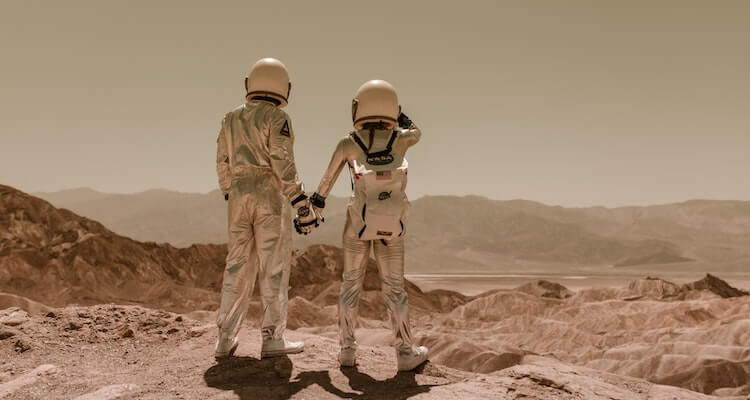Why Do We Need to Research Sex in Space?
Experts chime in on what people need to know about space sex and the surrounding research.

As our world and its climate continues to change, the mainstream media has started talking about humans living in space with renewed energy.
With those discussions come even more questions—around the habitats we’ll live in, the food we consume, and how we’ll have sex.
Some companies are already all over it. Sex toy producer TENGA even partnered with rocket manufacturer Interstellar Technologies Inc to send a penis stroker to space.
But there are many obstacles to overcome before being physically intimate in space. There are physical effects on the body from zero gravity, high radiation levels, stress, isolation, and who knows what else. Most recent discussions also focus solely on reproduction without mentioning pleasure or the potential of harassment or assault.
While we’ve written articles speculating how to have safer sex in space, we thought it was time to call in the experts.
For our latest Future of Sex Expert Series question, we asked: What do people need to know about why it is relevant for humans to study sex in space?
Rami Mandow, founder of SpaceAustralia.com

“Sex in space might seem like a Sci-Fi concept, but it is very much an active area of interest and research amongst the science communities, especially at the intersection between the emerging field of human health in space, and space exploration.
“There are a number of facets that arise when considering the need to better understand sex in space.
“This stems from the fact that humans are curious creatures—we are built to explore new things. A hot topic in space science today is sending humans to both a Lunar and Martian outpost—something likely achieved in the next few decades.”
Read Mandow’s full response: The Case for Studying Sex In Space
Dr. Simon Dubé, Ph.D. specializing in sex tech and sexuality in space and postdoctoral research fellow at the Kinsey Institute

“In light of upcoming long-term missions and settlements, national agencies and private space companies need to mitigate the risks related to sex in space, and facilitate the safe expression of human eroticism beyond our home planet.
“This starts by investing the necessary resources into space sexology—the scientific study of extraterrestrial intimacy and sexuality—and the development of training programs to prepare astronauts and future space inhabitants for the realities of space eroticism.
“Those who don’t may detrimentally impact the health of people who go into space for long periods of time, crew performance, and mission success. Those who do may instead reap the tremendous benefits of intimacy and sexuality in space: enhancing human well-being, normalizing spacelife, and gaining a strategic advantage in space exploration.”
Read more about Dr. Dubé’s work: Researchers Call on Space Programs to Support New Field
Dr. Eleanor Armstrong, co-founder of EXO-MOAN studio and postdoctoral research assistant at Stockholm University

“People have all kinds of sex for all kinds of reasons. We have solo sex and partnered sex. We have queer sex and we have straight sex. We have sex because we want babies and we have sex for pleasure. We have sex for the natural high after cumming, we have sex because we love the experience in the moment. We have sex with toys, we have sex with other people. Indeed, FutureofSex.net itself is somewhat a pantheon to the different possibilities of sex, the tools we’ve made to support all people to have healthy sex lives, and the systems we have to keep people safe when having sex.
“It’s taken us a while to get here—and it’s not been an easy ride to do so. So why do we suddenly stop thinking like this when we think about space?“I believe we should bring this plurality of sex with us into space and make sure we prioritize care, intimacy, and pleasure.”
Read Dr. Armstrong’s full response: Pleasure and Content in Sex in Space
Top image source: RODNAE Productions

















